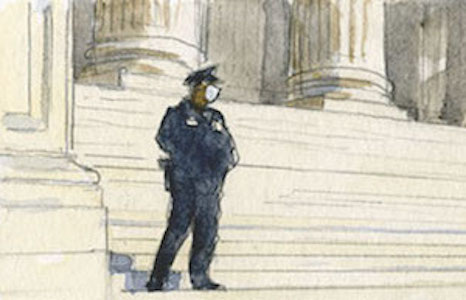Wednesday round-up

Yesterday the court issued two opinions, whittling its remaining cases down to eight. In Espinoza v. Montana Department of Revenue, the court held 5-4 that Montana’s exclusion of religious schools from a state-funded scholarship program for private schools violates the First Amendment. Amy Howe analyzes the opinion for this blog, in a post that first appeared at Howe on the Court. Mariam Marshedi has an analysis at Subscript Law. At NPR, Nina Totenberg and Brian Naylor report that “[t]he court’s decision is the latest in a series of recent rulings that have lowered the traditional wall separating church and state by requiring government entities to treat religious and nonreligious institutions more equally, even when that means sending public money to religious institutions.” At Fox News, Ronn Blitzer and others report that Chief Justice John “Roberts once again served as the swing vote in a 5-4 decision[; t]his time, he joined his fellow justices in the conservative wing of the court.” Mark Walsh reports at Education Week that “[t]he chief justice’s opinion appeared to cast doubt on provisions in as many as 30 state constitutions that bar aid to religious schools.” Additional coverage comes from Kevin Daley at The Washington Free Beacon.
At the Constitutional Law Prof Blog, Ruthann Robson writes that “the overall impression of Espinoza is a fragmented Court, despite the carefully crafted majority opinion.” John McCormack at National Review calls the case “an important victory for school-choice programs” that “has implications beyond school-choice scholarships.” At Slate, Leah Litman observes that the decision effects “a wild change from where the First Amendment was just a few decades ago.” The editorial board of The Wall Street Journal (subscription required) writes that, “[w]hatever his jurisprudential faults, Chief Justice John Roberts often sides with the angels in disputes over religious liberty.” [Disclosure: Goldstein & Russell, P.C., whose attorneys contribute to this blog in various capacities, is among counsel on an amicus brief in support of the respondents in this case.]
In yesterday’s second decided case, U.S. Patent and Trademark Office v. Booking.com, the court held 8-1 that adding “.com” to a generic term can create a protectable trademark. Jessica Litman analyzes the opinion for this blog.
At Stanford Law School’s Legal Aggregate blog, Bernadette Meyler explains why the decision earlier this term in Ramos v. Louisiana, which “required the Court to overrule an earlier case,” “suggests that there may be future debates about the precedential status of Roberts’ own opinion in” June Medical Services v. Russo, in which the court struck down a Louisiana law requiring physicians who perform abortions to have admitting privileges at a local hospital. At the Human Rights at Home Blog, Aziza Ahmed cautions that “we cannot rely on the principles of law to preserve abortion access with Conservative justices in the majority.” In an op-ed for The New York Times, Mary Ziegler observes that “this Supreme Court still seems quite willing (and even likely) to get rid of abortion rights if approached in the right way[; t]he question is whether abortion foes are up to the task.”
At Bloomberg Law, Lydia Wheeler reports that, “[i]n striking down a provision of the Dodd-Frank Act that protected the director of the Consumer Financial Protection Bureau from being fired and leaving the agency intact, Roberts signaled Monday that he may do something similar with the Affordable Care Act—toss out its mandate to buy insurance without throwing out the entire law, health lawyers say.” Also at Bloomberg Law, Cheryl Bolen and others report that, according to legal scholars, Monday’s decision in Seila Law v. Consumer Financial Protection Bureau “opens the door to future challenges against leaders of other independent federal agencies, especially if the court becomes more conservative.” Another look at the implications of the ruling for multi-member agencies like the Federal Energy Regulatory Commission comes from Pamela King at Greenwire (subscription required). Leah Litman writes at Slate that “[t]he court’s decision leaves open the possibility that any distinction between agencies—including differences that do not meaningfully change the amount of presidential control over an agency—are enough to invalidate them.” Additional commentary comes from Alan Morrison at the ACS Expert Forum blog and Michael Dorf at Dorf on Law.
Briefly:
- For The New York Times, Adam Liptak writes that pivotal votes in a series of recent high-profile decisions “underscored the larger truth about Chief Justice Roberts: 15 years into his tenure, he now wields a level of influence that has sent experts hunting for historical comparisons.”
- Also for The New York Times, Hailey Fuchs reports that “Daniel Lewis Lee is scheduled to be executed in less than two weeks,” after “the Supreme Court cleared the way for the federal executions to proceed, rejecting arguments against the use of a single drug to carry out the sentence by lethal injection,” “but he has been unable to see his lawyers for three months because of the coronavirus pandemic.”
- At Greenwire (subscription required), Niina Farah reports that the court on Monday “asked the Trump administration to weigh in on a battle over companies’ ability to seize state lands to build natural gas pipelines.”
- At The New Yorker, Lincoln Caplan looks at the case of Texas death-row inmate Billy Wardlow, who is petitioning the Supreme Court to stay his execution for a murder committed when Wardlow was 18: Wardlow’s petition argues that “recent neuroscientific research” shows that “[i]t’s not possible to predict that a young person who committed a violent crime is likely to commit another,” so that a jury cannot make a valid finding of future dangerousness, as is required to sentence someone to death in Texas.
We rely on our readers to send us links for our round-up. If you have or know of a recent (published in the last two or three days) article, post, podcast or op-ed relating to the Supreme Court that you’d like us to consider for inclusion in the round-up, please send it to roundup [at] scotusblog.com. Thank you!
Posted in Round-up
